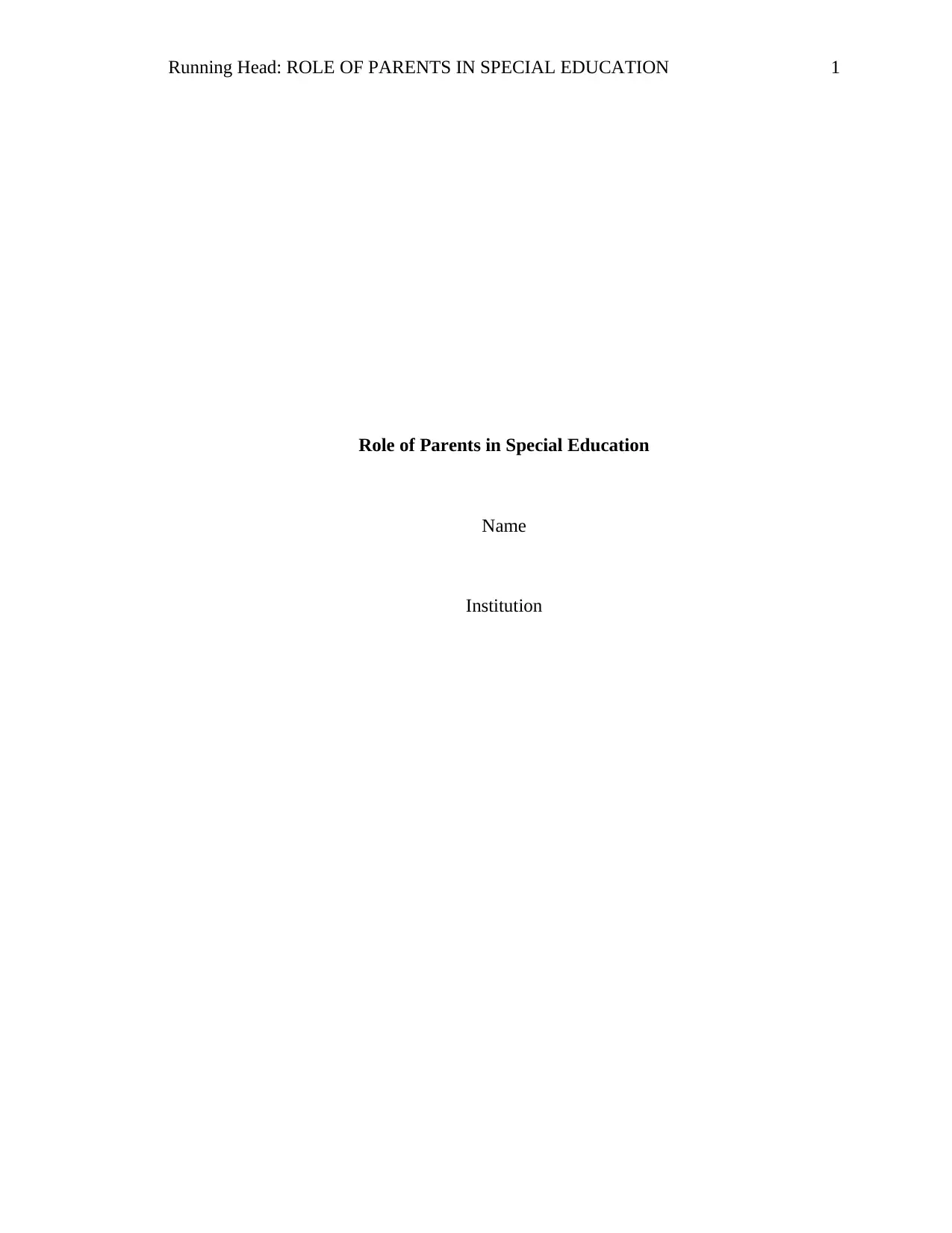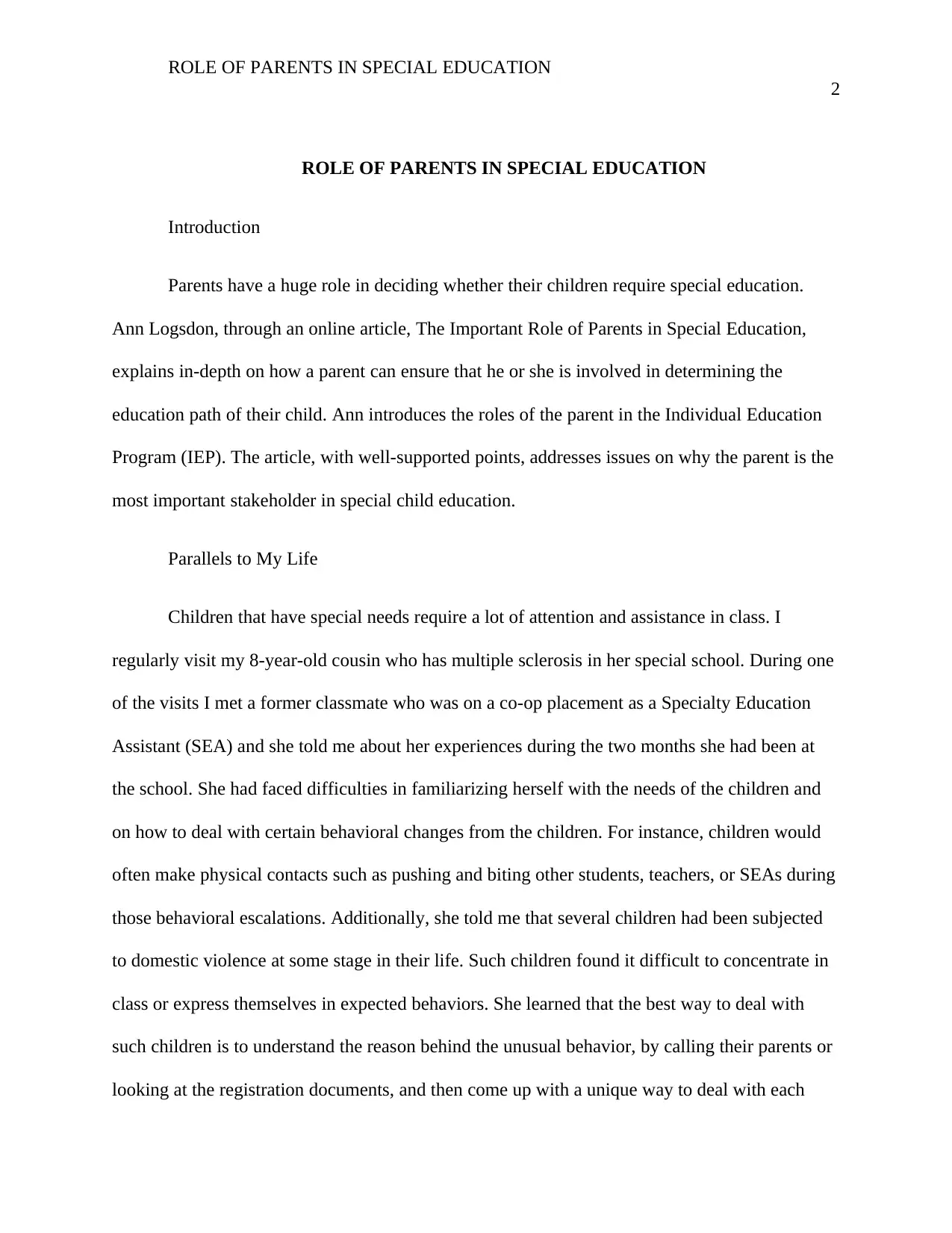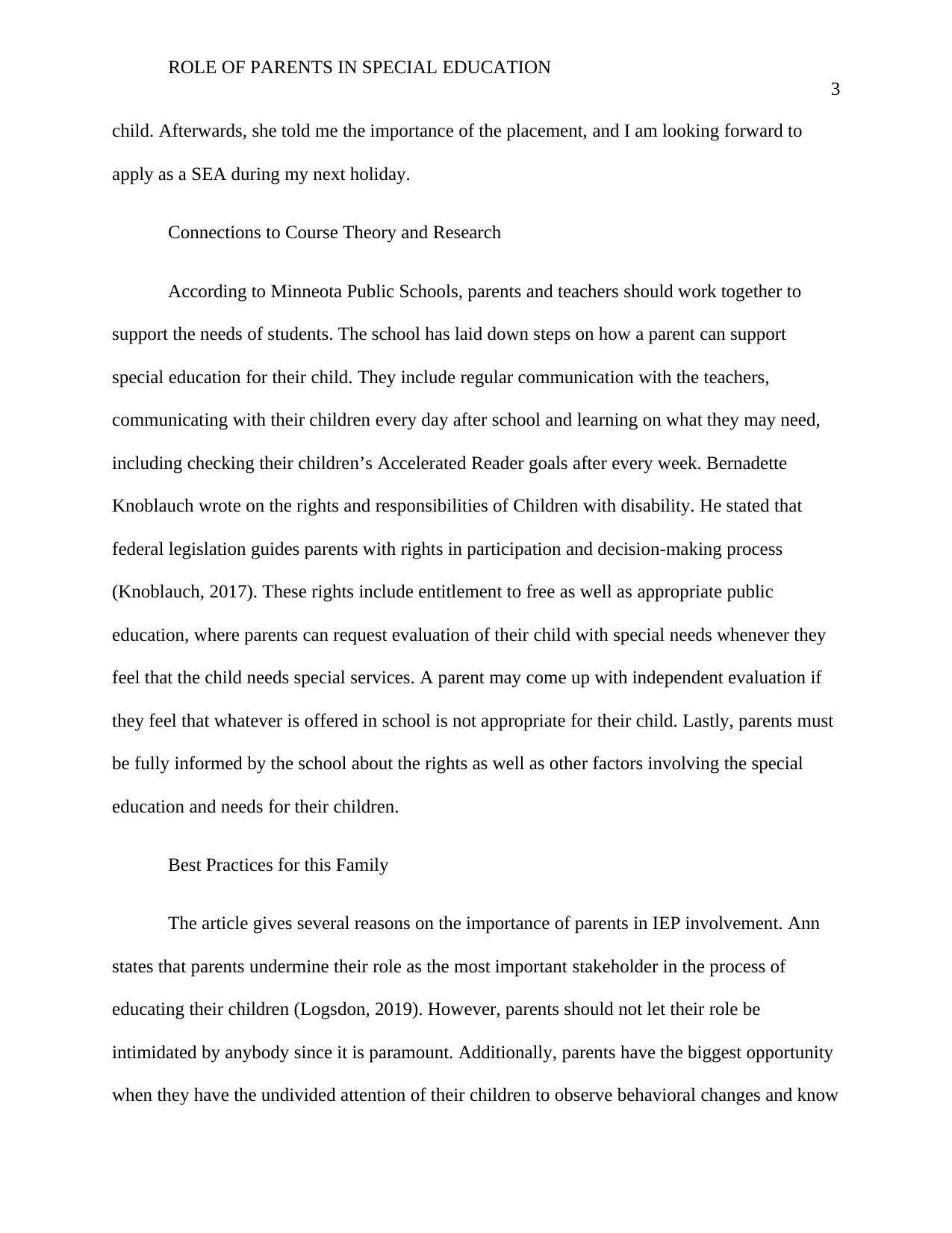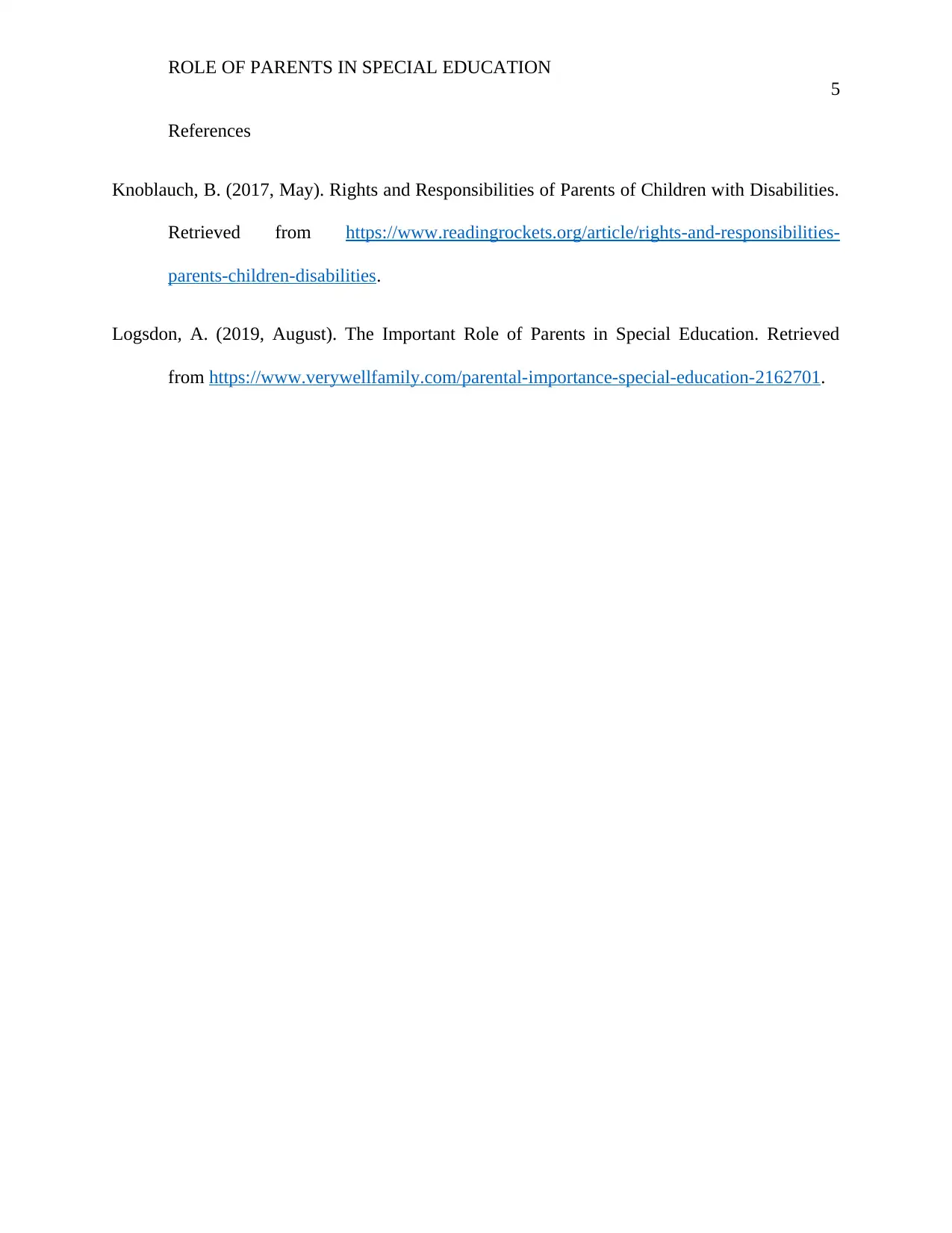Analysis of Parental Role in Special Education - SPE 411 Case Study
VerifiedAdded on 2022/10/13
|5
|970
|18
Case Study
AI Summary
This case study examines the crucial role of parents in special education, focusing on the importance of their involvement in the Individual Education Program (IEP). The assignment begins with a summary of an article emphasizing parental advocacy and communication. The student then draws parallels between the article's content and their personal experiences, including interactions with a cousin and a former classmate working as a Special Education Assistant (SEA). Furthermore, the analysis connects the article's concepts to course theories and research, citing resources on parental rights and responsibilities. The assignment concludes by outlining best practices for teachers and professionals to support families, emphasizing the need for open communication and collaboration between parents and educators to ensure the best outcomes for children with special needs. The author highlights the importance of parent-teacher communication and involvement in school policies to create a supportive learning environment.

Running Head: ROLE OF PARENTS IN SPECIAL EDUCATION 1
Role of Parents in Special Education
Name
Institution
Role of Parents in Special Education
Name
Institution
Paraphrase This Document
Need a fresh take? Get an instant paraphrase of this document with our AI Paraphraser

ROLE OF PARENTS IN SPECIAL EDUCATION
2
ROLE OF PARENTS IN SPECIAL EDUCATION
Introduction
Parents have a huge role in deciding whether their children require special education.
Ann Logsdon, through an online article, The Important Role of Parents in Special Education,
explains in-depth on how a parent can ensure that he or she is involved in determining the
education path of their child. Ann introduces the roles of the parent in the Individual Education
Program (IEP). The article, with well-supported points, addresses issues on why the parent is the
most important stakeholder in special child education.
Parallels to My Life
Children that have special needs require a lot of attention and assistance in class. I
regularly visit my 8-year-old cousin who has multiple sclerosis in her special school. During one
of the visits I met a former classmate who was on a co-op placement as a Specialty Education
Assistant (SEA) and she told me about her experiences during the two months she had been at
the school. She had faced difficulties in familiarizing herself with the needs of the children and
on how to deal with certain behavioral changes from the children. For instance, children would
often make physical contacts such as pushing and biting other students, teachers, or SEAs during
those behavioral escalations. Additionally, she told me that several children had been subjected
to domestic violence at some stage in their life. Such children found it difficult to concentrate in
class or express themselves in expected behaviors. She learned that the best way to deal with
such children is to understand the reason behind the unusual behavior, by calling their parents or
looking at the registration documents, and then come up with a unique way to deal with each
2
ROLE OF PARENTS IN SPECIAL EDUCATION
Introduction
Parents have a huge role in deciding whether their children require special education.
Ann Logsdon, through an online article, The Important Role of Parents in Special Education,
explains in-depth on how a parent can ensure that he or she is involved in determining the
education path of their child. Ann introduces the roles of the parent in the Individual Education
Program (IEP). The article, with well-supported points, addresses issues on why the parent is the
most important stakeholder in special child education.
Parallels to My Life
Children that have special needs require a lot of attention and assistance in class. I
regularly visit my 8-year-old cousin who has multiple sclerosis in her special school. During one
of the visits I met a former classmate who was on a co-op placement as a Specialty Education
Assistant (SEA) and she told me about her experiences during the two months she had been at
the school. She had faced difficulties in familiarizing herself with the needs of the children and
on how to deal with certain behavioral changes from the children. For instance, children would
often make physical contacts such as pushing and biting other students, teachers, or SEAs during
those behavioral escalations. Additionally, she told me that several children had been subjected
to domestic violence at some stage in their life. Such children found it difficult to concentrate in
class or express themselves in expected behaviors. She learned that the best way to deal with
such children is to understand the reason behind the unusual behavior, by calling their parents or
looking at the registration documents, and then come up with a unique way to deal with each

ROLE OF PARENTS IN SPECIAL EDUCATION
3
child. Afterwards, she told me the importance of the placement, and I am looking forward to
apply as a SEA during my next holiday.
Connections to Course Theory and Research
According to Minneota Public Schools, parents and teachers should work together to
support the needs of students. The school has laid down steps on how a parent can support
special education for their child. They include regular communication with the teachers,
communicating with their children every day after school and learning on what they may need,
including checking their children’s Accelerated Reader goals after every week. Bernadette
Knoblauch wrote on the rights and responsibilities of Children with disability. He stated that
federal legislation guides parents with rights in participation and decision-making process
(Knoblauch, 2017). These rights include entitlement to free as well as appropriate public
education, where parents can request evaluation of their child with special needs whenever they
feel that the child needs special services. A parent may come up with independent evaluation if
they feel that whatever is offered in school is not appropriate for their child. Lastly, parents must
be fully informed by the school about the rights as well as other factors involving the special
education and needs for their children.
Best Practices for this Family
The article gives several reasons on the importance of parents in IEP involvement. Ann
states that parents undermine their role as the most important stakeholder in the process of
educating their children (Logsdon, 2019). However, parents should not let their role be
intimidated by anybody since it is paramount. Additionally, parents have the biggest opportunity
when they have the undivided attention of their children to observe behavioral changes and know
3
child. Afterwards, she told me the importance of the placement, and I am looking forward to
apply as a SEA during my next holiday.
Connections to Course Theory and Research
According to Minneota Public Schools, parents and teachers should work together to
support the needs of students. The school has laid down steps on how a parent can support
special education for their child. They include regular communication with the teachers,
communicating with their children every day after school and learning on what they may need,
including checking their children’s Accelerated Reader goals after every week. Bernadette
Knoblauch wrote on the rights and responsibilities of Children with disability. He stated that
federal legislation guides parents with rights in participation and decision-making process
(Knoblauch, 2017). These rights include entitlement to free as well as appropriate public
education, where parents can request evaluation of their child with special needs whenever they
feel that the child needs special services. A parent may come up with independent evaluation if
they feel that whatever is offered in school is not appropriate for their child. Lastly, parents must
be fully informed by the school about the rights as well as other factors involving the special
education and needs for their children.
Best Practices for this Family
The article gives several reasons on the importance of parents in IEP involvement. Ann
states that parents undermine their role as the most important stakeholder in the process of
educating their children (Logsdon, 2019). However, parents should not let their role be
intimidated by anybody since it is paramount. Additionally, parents have the biggest opportunity
when they have the undivided attention of their children to observe behavioral changes and know
⊘ This is a preview!⊘
Do you want full access?
Subscribe today to unlock all pages.

Trusted by 1+ million students worldwide

ROLE OF PARENTS IN SPECIAL EDUCATION
4
how to deal with them easily. Consequently, parents should ensure that they attend the school
meetings of their children to raise their concerns during policymaking. They should say whatever
they think is appropriate in a free manner without feeling intimidated. Usually, whenever such
school rules or policies are passed by first considering the parents’ opinions, special children in
the school learn smoothly and important aspects of their lives are considered as it should be.
Similarly, back and forth communication between parents and teachers is encouraged because
the child lives with both stakeholders. A parent should inform the teacher of any behavioral
changes of the child. In addition, the teacher should also inform the parent on what to practice at
home. This will eventually be beneficial to the children and they will experience smooth learning
and growth.
Conclusion
All things considered, it is reasonable to say that Ann had a compelling article that really
should be read by parents that have enrolled their children for special education. The article
summarizes the importance of parents’ involvement in the IEP and shows how this helps the
child in school. With reasons, Ann also explains why the parents are the best advocates for their
child. However, the article should have put a few steps on how a parent should communicate
with the teaching staff at school so that there can be a flow of information from both sides.
Nonetheless, the article is relevant in our case and it was very helpful in my analysis.
4
how to deal with them easily. Consequently, parents should ensure that they attend the school
meetings of their children to raise their concerns during policymaking. They should say whatever
they think is appropriate in a free manner without feeling intimidated. Usually, whenever such
school rules or policies are passed by first considering the parents’ opinions, special children in
the school learn smoothly and important aspects of their lives are considered as it should be.
Similarly, back and forth communication between parents and teachers is encouraged because
the child lives with both stakeholders. A parent should inform the teacher of any behavioral
changes of the child. In addition, the teacher should also inform the parent on what to practice at
home. This will eventually be beneficial to the children and they will experience smooth learning
and growth.
Conclusion
All things considered, it is reasonable to say that Ann had a compelling article that really
should be read by parents that have enrolled their children for special education. The article
summarizes the importance of parents’ involvement in the IEP and shows how this helps the
child in school. With reasons, Ann also explains why the parents are the best advocates for their
child. However, the article should have put a few steps on how a parent should communicate
with the teaching staff at school so that there can be a flow of information from both sides.
Nonetheless, the article is relevant in our case and it was very helpful in my analysis.
Paraphrase This Document
Need a fresh take? Get an instant paraphrase of this document with our AI Paraphraser

ROLE OF PARENTS IN SPECIAL EDUCATION
5
References
Knoblauch, B. (2017, May). Rights and Responsibilities of Parents of Children with Disabilities.
Retrieved from https://www.readingrockets.org/article/rights-and-responsibilities-
parents-children-disabilities.
Logsdon, A. (2019, August). The Important Role of Parents in Special Education. Retrieved
from https://www.verywellfamily.com/parental-importance-special-education-2162701.
5
References
Knoblauch, B. (2017, May). Rights and Responsibilities of Parents of Children with Disabilities.
Retrieved from https://www.readingrockets.org/article/rights-and-responsibilities-
parents-children-disabilities.
Logsdon, A. (2019, August). The Important Role of Parents in Special Education. Retrieved
from https://www.verywellfamily.com/parental-importance-special-education-2162701.
1 out of 5
Related Documents
Your All-in-One AI-Powered Toolkit for Academic Success.
+13062052269
info@desklib.com
Available 24*7 on WhatsApp / Email
![[object Object]](/_next/static/media/star-bottom.7253800d.svg)
Unlock your academic potential
Copyright © 2020–2026 A2Z Services. All Rights Reserved. Developed and managed by ZUCOL.





